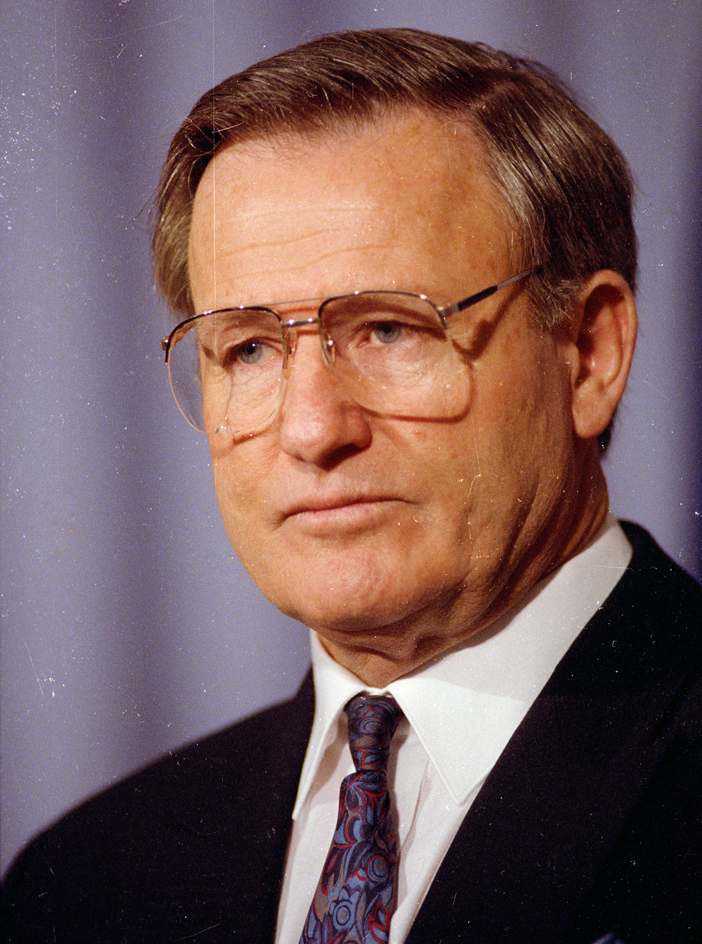Bolger, Jim (1935-…), served as prime minister of New Zealand from 1990 to 1997. He was the leader of the New Zealand National Party, a conservative political party. The National Party has traditionally favored free enterprise, a system that allows people to carry out most economic activities free from government control.

In 1990 and 1993, Bolger led the National Party to victory in parliamentary elections. In 1996, the National Party won the most seats in Parliament but not a majority. It then formed a coalition (partnership) with the New Zealand First party, and Bolger remained prime minister. In 1997, Jenny Shipley replaced Bolger as leader of the National Party and as prime minister. She became the first woman to serve as prime minister of New Zealand.
Early life and family
James Brendan Bolger was born on May 31, 1935, in the small town of Opunake. Opunake is in the western Taranaki region of New Zealand’s North Island. Bolger was one of five children born to Daniel Bolger and his wife, Cecilia Doyle Bolger. Daniel and Cecilia were farmers who had immigrated to New Zealand from Ireland. Jim left school at age 15 to work on the family dairy farm. He later started a farm of his own and raised sheep and cattle. In 1963, Bolger married Joan Maureen Riddell, the daughter of Frank Riddell, a farmer, and his wife, Eleanor. Jim and Joan Bolger had six sons and three daughters.
Political career
Jim Bolger quickly became active in politics. He joined a local branch of Federated Farmers, an agricultural organization, and worked on improving conditions for farmers. In 1972, Bolger ran as a member of the National Party for a seat in New Zealand’s Parliament. On November 25, he won election to the King Country (now part of Taranaki-King Country) seat in the House of Representatives. Robert Muldoon became prime minister of New Zealand in 1975, when the National Party won the general election.
Government positions.
Bolger held a number of positions in Muldoon’s government. In 1977, he became minister of fisheries and associate minister of agriculture. From 1978 to 1984, Bolger served as minister of labor, and from 1978 to 1981, he was minister of immigration. The Labour Party defeated the National Party in the 1984 election, ending Muldoon’s time as prime minister. Bolger became deputy leader of the National Party in November 1984 and party leader in March 1986.
Prime minister.
In 1990, Bolger and the National Party campaigned on the promise of “Creating a Decent Society.” The phrase was intended as criticism of the Labour Party administration. The National Party won the election on Oct. 27, 1990, and Bolger became prime minister.
Bolger took office on Nov. 2, 1990. His government faced an economic emergency. One of New Zealand’s largest banks, the Bank of New Zealand, teetered near collapse. Just three days after taking office, Bolger’s government agreed to a bailout of 620 million New Zealand dollars to rescue the bank. The bailout forced Bolger’s government to alter its budget, and little money was left for most of Bolger’s campaign promises. Bolger claimed that the previous Labour government had hidden the severity of New Zealand’s economic problems.
Bolger continued many of the economic policies begun by the Labour Party in the 1980’s. However, he also reduced welfare and public health benefits. In addition, he lessened government regulation of relations between employers and labor unions. Under the Bolger administration, New Zealand increased its exports, thanks in part to an earlier free-trade agreement with Australia that went into full effect in 1990. New Zealand experienced modest economic growth, but the country’s unemployment rate rose above 10 percent in 1992.
In 1995, Bolger’s government reached an agreement with the Tainui, a North Island Māori tribal federation. Māori are a Polynesian people who were the first to live in what is now New Zealand. The negotiations centered on lands and resources that were taken from Māori by colonists in the mid-1800’s. The agreement called for financial payments and the return of land. The settlement also included a formal government apology for historical injustices. Also in 1995, Bolger opposed French nuclear testing in the South Pacific Ocean.
Bolger’s popularity had declined over time, and he faced growing opposition. In late 1997, while Bolger was in Scotland, Jenny Shipley challenged his leadership of the National Party and persuaded a majority of party members to back her. Without calling for a vote, Bolger resigned as leader of the National Party in early November and as prime minister on December 8. Shipley replaced him in both roles.
Life after politics
On Dec. 31, 1997, Bolger was appointed a member of the Order of New Zealand, the nation’s highest honor. From June 1998 to January 2002, he served as New Zealand’s ambassador to the United States.
Bolger has since held a variety of posts. He has served as chair of New Zealand Post, Kiwibank, and of the New Zealand United States Council. The New Zealand United States Council is an organization that seeks to expand trade and economic links between the two countries. Bolger has also served as an adviser to the World Agricultural Forum and a number of other organizations. In 2007, he became chancellor of the University of Waikato on New Zealand’s North Island. From 2008 to 2010, he was chair of KiwiRail, the government-owned rail and ferry system.
